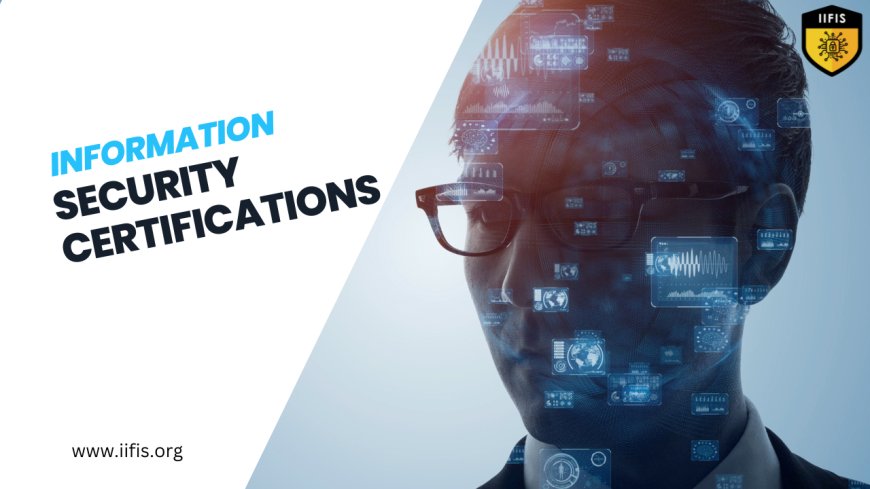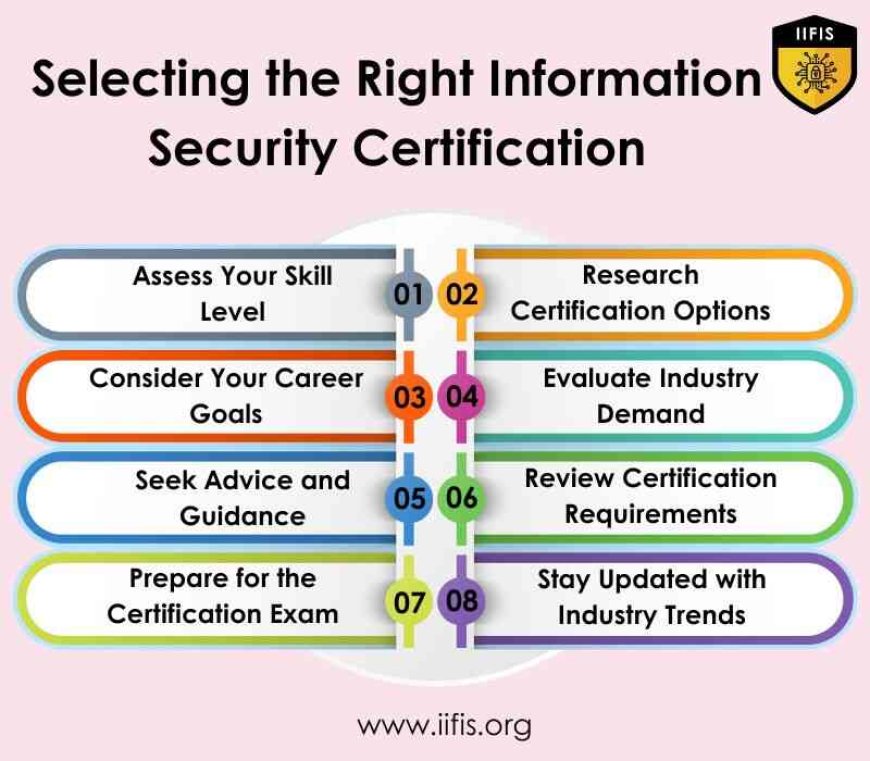Types of Information Security Certifications
Explore various types of Information Security Certifications, including CISSP, CISA, CEH, and more. Boost your cybersecurity career with the right credentials.

Information Security Certifications are important for verifying knowledge and improving employment opportunities in the cybersecurity industry. These qualifications provide verifiable proof of a person's expertise in several kinds of information security-related fields, from core concepts to specific fields like network security or incident response. Employers can feel confident in the qualified professional's abilities thanks to certifications such as CompTIA Security+ and qualified Information Systems Security Professional (CISSP), which have a strong reputation in the field.
Professionals with information security certificates are more competitive and marketable, which significantly increases employment chances. Companies actively seek candidates who hold these certifications since they consider them as indicators of further education and cybersecurity expertise. Certifications set certified professionals apart as leaders in their area and are frequently required for certain employment responsibilities and promotions. Investing in these certifications provides job advancement and success in cybersecurity in besides validating skills.
Selecting the Right Information Security Certification
-
Assess Your Skill Level:
Analyze your current information security knowledge and experience before entering into certifications. Discover if you are a developed professional looking to specialize in a certain field or a beginner seeking basic knowledge.
-
Research Certification Options :
Examine the wide variety of information security certifications that the market has to offer. Each certification offers unique benefits and focuses on a different part of cybersecurity, ranging from core ones like CompTIA Security+ to specialist ones like Certified Ethical Hacker (CEH) or Certified Information Systems Security Professional (CISSP).
-
Consider Your Career Goals:
Think about your goals for the future and how a certification can help you achieve them. Are you trying to progress in your career or are you aiming for a certain job role? Select a certification that will help you achieve your professional goals and increase your value to employers.
-
Evaluate Industry Demand:
Examine the industry's need for various information security certifications. To improve your professional reputation and employment prospects, look for certificates that are highly recognized and respected by companies.
-
Seek Advice and Guidance:
Consult with mentors or seasoned information security specialists for help. Their opinions can provide insightful advice based on their personal experiences and assist you in selecting the certification that best suits your needs.
-
Review Certification Requirements:
Take a detailed look at the requirements and qualifications for every certification. Before committing to a certification path, be sure you meet the qualifying requirements, as some certifications may call for particular school backgrounds or professional experience.
-
Prepare for the Certification Exam:
Invest time and energy into verifying you are completely ready for the certification exam. Make use of training programs, study guides, and mock tests to improve your knowledge and raise your chances of success.
-
Stay Updated with Industry Trends:
Since the field of information security is always changing, keep up with the most recent advancements and trends in the business. To keep up your knowledge and proficiency in information security, make ongoing investments in education and career advancement.

What are the different types of information security certifications available?
Maintaining cybersecurity is crucial in protecting private data. People search for information security certificates to meet the demand for qualified personnel. These certifications attest to proficiency and address various specializations and skill levels in cybersecurity. Let's examine the many kinds of information security certifications and their importance in today's technologically advanced society.
-
Foundational Certifications: These certifications cover the foundational ideas of information security and are appropriate for beginners. CompTIA Security+ and Certified Information Systems Auditor (CISA) are two examples of certifications that offer a strong grasp of fundamental security concepts and procedures.
-
Specialized Certifications: These certificates allow people to specialize in particular cybersecurity domains by focusing on specific elements within the field. For example, the Certified Cloud Security Professional (CCSP) is an expert in cloud security, and the Certified Ethical Hacker (CEH) specializes in ethical hacking methods.
-
Advanced Certifications: Advanced certificates are designed for professionals with more expertise and go further into intricate security principles and methods. Notable examples are the Certified Information Security Manager (CISM) and the Certified Information Systems Security Professional (CISSP), both of which need much experience and knowledge in the security field.
-
Vendor-Specific Certifications: These certifications, which technology companies provide, verify competence with particular platforms or products. Examples of certifications that show knowledge of vendor-specific security solutions are Microsoft Certified: Azure Security Engineer Associate and Cisco Certified CyberOps Associate.
-
Compliance and Governance Certifications: Professionals operating in regulated industries need to focus on regulatory compliance and governance structures, which is why these qualifications are important. Compliance with rules and regulations such as GDPR and HIPAA is emphasized by certifications such as Certified Information Privacy Professional (CIPP) and Certified Information Security Manager (CISM).
Tips and Resources for Success
Set Clear Objectives:
-
Define your objectives for earning the certification first. Whether your goal is to grow professionally or improve your talents, having a clear purpose will help you stay motivated along the way.
Research Certification Options:
-
Examine the different information security certifications offered and select the one that most closely matches your interests and professional goals. Take into account things like the need for particular credentials in the sector and your present level of knowledge.
Develop a Study Plan:
-
Make a well-organized study schedule that includes the subjects you must cover and the amount of time you will spend studying every day or week. Divide the material into manageable portions to maximize the effectiveness of your study sessions.
Utilize Study Materials:
-
Use several kinds of study tools, such as study guides, practice tests, online courses, and textbooks. Seek reliable sites that are suggested by experts in the subject to guarantee high-quality educational resources.
Practice Regularly:
-
To succeed in information security certifications, practice is crucial. Practice responding to questions, participate in practical experiments, and play out real-world situations to help you learn the most important ideas.
Join Study Groups:
-
If you want to network with other certification candidates, think about joining study groups or online forums. You can improve your learning process by talking with peers about difficult subjects, asking questions, and sharing your experiences.
Attend Training Courses:
-
Participate in training programs provided by respectable companies or training providers. These courses frequently include a well-organized syllabus, professional guidance, and practical tasks to help in your certification exam preparation.
Stay Informed:
-
Stay informed about the most recent advancements, trends, and information security best practices. To stay up to date on new developments and risks in the sector, follow blogs, sign up for webinars, and attend events.
Take Practice Exams:
-
Exam practice is vital for determining your level of preparedness and identifying your areas of weakness. Before the exam, use them to evaluate your knowledge and abilities in a test-like setting.
Stay Focused and Persistent:
-
As you pursue your certification, don't lose sight of your objectives or your optimistic outlook. Be tenacious, maintain discipline in your study regimen, and resist the need to give up in the face of challenges or defeats.
Information security certifications verify knowledge and improve job opportunities in the field. Selecting the best certification requires evaluating skills, looking into possibilities, and taking your career goals into account. The secret to exam preparation and professional growth is to use the resources that are accessible and to apply practical advice. In the current digital era, cybersecurity must be maintained, and certifications are vital for preventing cyberattacks and maintaining a safe online environment. Professionals can succeed in their cybersecurity professions and support continuous efforts to protect sensitive information by investing in certifications and keeping up with industry trends.























